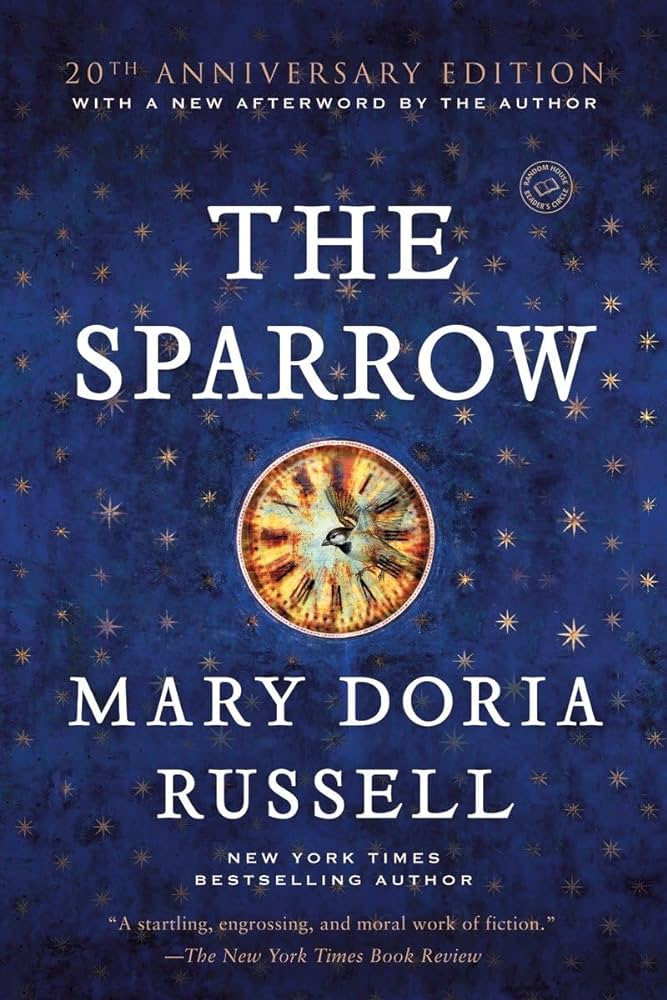“Not one sparrow can fall to the ground without your Father knowing it.”
“But the sparrow still falls,” Felipe said.

Year published: 1997
Category: sci-fi
CW: Rape, body horror, sex trafficking of a child, murder of children, (alien) eugenics
Summary: In 2019, humanity finally finds proof of extraterrestrial life when a listening post in Puerto Rico picks up exquisite singing from a planet that will come to be known as Rakhat. While United Nations diplomats endlessly debate a possible first contact mission, the Society of Jesus quietly organizes an eight-person scientific expedition of its own. What the Jesuits find is a world so beyond comprehension that it will lead them to question what it means to be “human.”
My thoughts: This is one of the most ambitious books I’ve read in a long time. It features a wide scope of knowledge and strong characterization, and it grapples with some of the most profound of questions about human suffering and faith.
The exploration of religious faith and suffering is at the book’s heart, and it is the core of Emilio’s characterization. He goes from agnosticism to faith to utter devotion to complete devastation. His belief in God is shattered by the catastrophes that happen on Rakhat and now he has to live in the aftermath of that total loss and horror while still trying to make sense of it (and therefore still “looking for God” in it).
The fundamental question that he has to grapple with is as follows: if God exists and we turn to him in thanks for the good things that happen in our lives, how do we make sense of our suffering? You can assume that God is not in fact a benevolent, loving God because he allows atrocities to happen to us; you can try to tell yourself that it is all part of a bigger plan and it will one day have meaning. The final option is just to accept that you deluded yourself into finding meaning where there was none – suffering is suffering with no greater meaning. This is the crisis that Emilio faces.
Emilio is an incredibly strong character. A physical and mental wreck in addition to a man facing a total crisis of faith, we see his pride, his hatred of being dependent on others, and how much he absolutely loathes being forced to tell his story to self-righteous, unsympathetic people who blame him for his own violation and simply cannot understand the horror that he has endured given how comfortable they remain in their own faith.
The other characters, especially the rest of the Rakhat crew, are very strong as well. They have close bonds, interesting conversations and great senses of humor. A lot of the book is just them bonding, discussing life and faith, and having fun together. This makes the gut punch of the book’s downward spiral all the more brutal. I was also very impressed by the sheer amount of theory and technical knowledge that the book encompassed, from linguistics to religious theory, anthropology and biology and space travel. That being said, I do not know that much about any of these things, so it’s hard to say if an expert in any of these fields would agree with me. I guess it’s safe to say that it stuck this laywoman as being very impressive .
And that is to say nothing of the inventiveness of the culture on Rakhat. The fundamental premise of the Runa and Jana’ata is so fascinating with the development of evolved predators and prey that they breed, all of their cultural specifics from how they conceptualize space to how they smell, and how the humans impact their world in ways that they never could have predicted. Alien first contact is a staple of sci-fi, and this is one of the most thoughtful examples I’ve seen where the pitfalls and culture clashes are depicted very well.
Really, my only caveat is that in the afterward to the sequel, Russell talks about how real-world historical missionaries and conquerors are held to unfair standards when we look back at them and she intended to write a story where they were more sympathetic than they usually are. Another quote on the general theme:
“Here, I had in mind the invasion of North America by European settlers. That was unquestionably a catastrophe for the native peoples of this continent, but at the same time, it was the best damned thing that ever happened to an awful lot of immigrants from around the world.”
I’m not entirely convinced her argument here is supposed to be that it balances out in some way – maybe just that the same event is experienced in entirely different ways by those who benefit and those who suffer? It’s a kind of strange point to make and I still feel somewhat confused by what Russell is trying to do here. I did some poking around and found some interesting lit analysis about the exploration of colonialism in this book- I copied down this quote but cannot for the life of me find where I got it from: “Russell subtly raises concerns about the ways in which sophisticated cultures tell themselves cover stories in order to justify actions taken at a terrible cost to others.” If this is what she meant by making those who do harm “sympathetic,” then I think she certainly succeeds in the context of her own story, but I would personally argue that any overall comparison between the humans in this book and North America’s conquerors is still a lacking one. My thoughts about this are very messy and uncertain and I’d be interested to hear others’ opinions as well.

Leave a comment